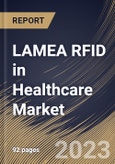RFID points to its significant potential for improving patient safety and cutting expenses in healthcare institutions. RFID was first used to monitor medical equipment, medications, personnel, and patients. RFID is a technology that sends radio waves via tags with electronic chips within. The tag includes details on the items or people, their precise location, and other information like the lot number and expiry date of pharmaceuticals and medical supplies and the patient's allergies or blood type, among others.
The data may be utilized by the personnel or kept in a database after being transferred to a reader within the building. Most healthcare institutions used to manually or bar-code monitor different resources and patients. Those who support RFID see several potential benefits over traditional bar-coded Auto-ID technology for streamlining supply chains and other activities. Barcode labels are typically read-only. However, RFID tags offer unique features, including the ability to read and write, which makes them flexible. Compared to barcode scanning, which needs labels to be read one at a time, reading several RFID tags simultaneously boosts efficiency.
The UAE government is making efforts to expand the number of medical tourists coming to the nation for Dubai to become a regional center for first-rate healthcare. The country has a robust infrastructure for transportation and logistics. The public system supports national vaccination efforts and medical diagnosis and treatment. It provides free medication for various chronic conditions, focusing on the elderly and small children. The region's well-established and expanding healthcare infrastructure is expected to lead to a rise in the use of RFID technology in healthcare, hence promoting market expansion.
The Brazil market dominated the LAMEA RFID in Healthcare Market by Country in 2022, and would continue to be a dominant market till 2030; thereby, achieving a market value of $239.1 million by 2030. The Argentina market is exhibiting a CAGR of 21.4% during (2023-2030). Additionally, The UAE market would register a CAGR of 20.4% during (2023-2030).
Based on Application, the market is segmented into Asset Tracking, Pharmaceutical Tracking, Patient Tracking, Blood Tracking and Others. Based on Product, the market is segmented into Tags and Systems & Software. Based on countries, the market is segmented into Brazil, Argentina, UAE, Saudi Arabia, South Africa, Nigeria, and Rest of LAMEA.
The market research report covers the analysis of key stake holders of the market. Key companies profiled in the report include Honeywell International, Inc., Alien Technology, LLC, Zebra Technologies Corp., Avery Dennison Corporation, Impinj, Inc., 3M Company, Invengo Technology Pte. Ltd., Siemens AG, Fujitsu Limited and Terso Solutions, Inc. (Promega Corporation).
Scope of the Study
By Application
- Asset Tracking
- Pharmaceutical Tracking
- Patient Tracking
- Blood Tracking
- Others
By Product
- Tags
- Systems & Software
By Country
- Brazil
- Argentina
- UAE
- Saudi Arabia
- South Africa
- Nigeria
- Rest of LAMEA
Key Market Players
List of Companies Profiled in the Report:
- Honeywell International, Inc.
- Alien Technology, LLC
- Zebra Technologies Corp.
- Avery Dennison Corporation
- Impinj, Inc.
- 3M Company
- Invengo Technology Pte. Ltd.
- Siemens AG
- Fujitsu Limited
- Terso Solutions, Inc. (Promega Corporation)
Unique Offerings
- Exhaustive coverage
- The highest number of Market tables and figures
- Subscription-based model available
- Guaranteed best price
- Assured post sales research support with 10% customization free
Table of Contents
Companies Mentioned
- Honeywell International, Inc.
- Alien Technology, LLC
- Zebra Technologies Corp.
- Avery Dennison Corporation
- Impinj, Inc.
- 3M Company
- Invengo Technology Pte. Ltd.
- Siemens AG
- Fujitsu Limited
- Terso Solutions, Inc. (Promega Corporation)







